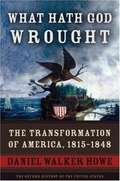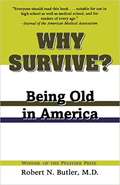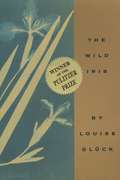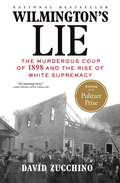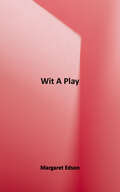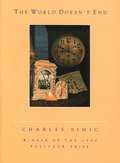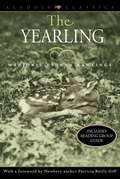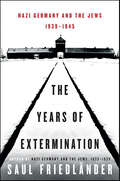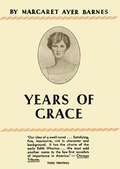Special Collections
Pulitzer Prize Award Winners
Description: Bookshare is pleased to offer the following titles, winners of the Pulitzer Prize Award. Note: Some drama winners are available and are listed under Fiction awards. #award
- Table View
- List View
What Hath God Wrought
by Daniel Walker HoweThe Oxford History of the United States is by far the most respected multi-volume history of our nation. The series includes two Pulitzer Prize winners, two New York Times bestsellers, and winners of the Bancroft and Parkman Prizes. Now, in What Hath God Wrought, historian Daniel Walker Howe illuminates the period from the battle of New Orleans to the end of the Mexican-American War, an era when the United States expanded to the Pacific and won control over the richest part of the North American continent. Howe's panoramic narrative portrays revolutionary improvements in transportation and communications that accelerated the extension of the American empire. Railroads, canals, newspapers, and the telegraph dramatically lowered travel times and spurred the spread of information. These innovations prompted the emergence of mass political parties and stimulated America's economic development from an overwhelmingly rural country to a diversified economy in which commerce and industry took their place alongside agriculture. In his story, the author weaves together political and military events with social, economic, and cultural history. He examines the rise of Andrew Jackson and his Democratic party, but contends that John Quincy Adams and other Whigs--advocates of public education and economic integration, defenders of the rights of Indians, women, and African-Americans--were the true prophets of America's future. He reveals the power of religion to shape many aspects of American life during this period, including slavery and antislavery, women's rights and other reform movements, politics, education, and literature. Howe's story of American expansion culminates in the bitterly controversial but brilliantly executed war waged against Mexico to gain California and Texas for the United States. By 1848 America had been transformed. What Hath God Wrought provides a monumental narrative of this formative period in United States history.
Pulitzer Prize Winner
Why Survive? Being Old in America
by Robert Olen ButlerThe author questions the value of long life for its own sake, arguing that modern medicine has ironically created a group for whom survival is possible but satisfaction elusive. He proposed reforms to redefine and restructure the institutions responsible for the elderly in America.
Pulitzer Prize Winner
The Wild Iris
by Louise GlückThis collection of stunningly beautiful poems encompasses the natural, human, and spiritual realms, and is bound together by the universal themes of time and mortality. With clarity and sureness of craft, Gluck's poetry questions, explores, and finally celebrates the ordeal of being alive.
Pulitzer Prize Winner
Wilmington's Lie
by David ZucchinoBy the 1890s, Wilmington was North Carolina’s largest city and a shining example of a mixed-race community. It was a bustling port city with a burgeoning African American middle class and a Fusionist government of Republicans and Populists that included black aldermen, police officers and magistrates. There were successful black-owned businesses and an African American newspaper, The Record. But across the state—and the South—white supremacist Democrats were working to reverse the advances made by former slaves and their progeny. In 1898, in response to a speech calling for white men to rise to the defense of Southern womanhood against the supposed threat of black predators, Alexander Manly, the outspoken young Record editor, wrote that some relationships between black men and white women were consensual. His editorial ignited outrage across the South, with calls to lynch Manly. But North Carolina’s white supremacist Democrats had a different strategy. They were plotting to take back the state legislature in November “by the ballot or bullet or both,” and then use the Manly editorial to trigger a “race riot” to overthrow Wilmington’s multi-racial government. Led by prominent citizens including Josephus Daniels, publisher of the state’s largest newspaper, and former Confederate Colonel Alfred Moore Waddell, white supremacists rolled out a carefully orchestrated campaign that included raucous rallies, race-baiting editorials and newspaper cartoons, and sensational, fabricated news stories. With intimidation and violence, the Democrats suppressed the black vote and stuffed ballot boxes (or threw them out), to win control of the state legislature on November eighth. Two days later, more than 2,000 heavily armed Red Shirts swarmed through Wilmington, torching the Record office, terrorizing women and children, and shooting at least sixty black men dead in the streets. The rioters forced city officials to resign at gunpoint and replaced them with mob leaders. Prominent blacks—and sympathetic whites—were banished. Hundreds of terrified black families took refuge in surrounding swamps and forests. This brutal insurrection is a rare instance of a violent overthrow of an elected government in the U.S. It halted gains made by blacks and restored racism as official government policy, cementing white rule for another half century. It was not a “race riot,” as the events of November 1898 came to be known, but rather a racially motivated rebellion launched by white supremacists. In this book, the author uses contemporary newspaper accounts, diaries, letters and official communications to create a gripping and compelling narrative that weaves together individual stories of hate and fear and brutality. This is a dramatic and definitive account of a remarkable but forgotten chapter of American history.
Wit
by Margaret EdsonMost of the action, but not all, takes place in a room of the University Hospital Comprehensive Cancer Center. The stage is empty, and furniture is roiled on and off by the technicians. Jason and Kelekian wear lab coats, but each has a different shirt and tie every time he enters. Susie wears white jeans, white sneakers, and a different blouse each entrance. Scenes are indicated by a line role in the script; there is no break in the action between scenes, but there might be a change in lighting. There is no intermission. Vivian has a central-venous-access catheter over her le{ breast, so the IV tubing goes there, not into her arm. The IV pole, with a Port-a-Pump attached, rolls easily on wheels. Every time the IV pole reappears, it has a different configuration of bottles.
The World Doesn't End
by Charles SimicIn this collection, winner of the 1990 Pulitzer Prize, Charles Simic puns, pulls pranks. He can be jazzy and streetwise. Or cloak himself in antiquity. Simic has new eyes, and in these wonderful poems and poems-in-prose he lets the reader see through them.
The Yearling
by Marjorie Kinnan RawlingsNo novel better epitomizes the love between a child and a pet than The Yearling. Young Jody adopts an orphaned fawn he calls Flag and makes it a part of his family and his best friend. But life in the Florida backwoods is harsh, and so, as his family fights off wolves, bears, and even alligators, and faces failure in their tenuous subsistence farming, Jody must finally part with his dear animal friend. There has been a film and even a musical based on this moving story, a fine work of great American literature.
Pulitzer Prize Winner
The Years of Extermination
by Saul Friedländer"Establishes itself as the standard historical work on Nazi Germany’s mass murder of Europe’s Jews. . . . An account of unparalleled vividness and power that reads like a novel. . . . A masterpiece that will endure." — New York Times Book ReviewThe Years of Extermination, the completion of Saul Friedländer's major historical opus on Nazi Germany and the Jews, explores the convergence of the various aspects of the Holocaust, the most systematic and sustained of modern genocides.The enactment of the German extermination policies that resulted in the murder of six million European Jews depended upon many factors, including the cooperation of local authorities and police departments, and the passivity of the populations, primarily of their political and spiritual elites. Necessary also was the victims' willingness to submit, often with the hope of surviving long enough to escape the German vise.In this unparalleled work—based on a vast array of documents and an overwhelming choir of voices from diaries, letters, and memoirs—the history of the Holocaust has found its definitive representation.
Years of Grace
by Margaret Ayer BarnesYears of Grace is the story of forty years and the changes wrought in two generations. Set in Chicago, the novel focuses on Jane Ward, daughter of a socially prominent family, who grows up in the repressed, pseudo-genteel society of the 1880s and 1890s. In her youth, indeed, throughout her life, Jane is a model of decorum. She refuses to marry a young artist whom she loves, because her parents disapprove. She accepts a family-approved husband because it is expected of her. She avoids an affair later in life because it might disgrace husband and family. Twenty years later, Jane's daughter Cicily encounters the identical decisions, but being a product of the war years, when marriage is fast and divorce easy, Cicily cares little for reputation, and lives her life accordingly. Through it all. Mrs. Barnes maintains a scrupulous neutrality, presenting each life as a reflection of the times, never presuming to judge or moralize. If a change in attitude is apparent between generations, it represents only a portion of the total evolvement of society during the forty year period; and Mrs. Barnes reflects in minute detail, changes in fashion, architecture, and interior decor as well as history and social conditions.
The author's first novel, Years of Grace won the Pulitzer Prize for Literature in 1931.
